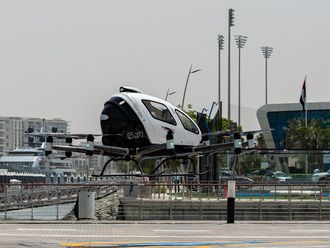Dubai: Women in the UAE and the rest of the Middle East and North Africa (Mena) region remain substantially under-represented in business because they lack the confidence, funding and knowledge to start their own enterprise, experts in Dubai said on Tuesday.
“Every day, women continue to find innovative ideas that can be transformed into profitable businesses, but many of them struggle to obtain the skills, support and resources,” said Raja Easa Al Gurg, president of the Dubai Business Women Council (DBWC).
Al Gurg was speaking at the launch of Ro’Ya, a collaboration between the DBWC and MasterCard that seeks to mobilise and encourage women to turn their passions into money-making ventures. The aim of the group is to provide coaching and mentorship to aspiring female entrepreneurs looking to establish their own enterprise. Ro’Ya is an Arabic word that means “vision”.
Although women have made great strides toward gender equality, men continue to dominate the region’s economy as entrepreneurs. Small and medium enterprises (SMEs), which make up 95 per cent of the private sector in Mena, are a driving force of the region.
However, only 2.5 per cent of small businesses in Mena, or 300,000 out of 12 million SMEs, were owned by women, according to the Carnegie Endowmen Centre. The gender gap is not as wide on a global scale where more than a third (37 per cent) of enterprises are women-owned.
Nadine Halabi, coordinator at the DBWC, said many women in the UAE have entrepreneurial aspirations, but the lack of financial support is holding them back.
“A lot of them are passionate about starting something but when they go to the financial institutions, to get a loan, their hopes are shattered because they don’t qualify,” Halabi told Gulf News.
The other problem stems from the lack of confidence among women to step forward and make their ideas actually happen.
“Funding is a challenge [to everyone], but when it comes particularly to women, there’s a specific issue, which is ‘Do I have a courage to step forward? or ‘What framework can I use’? Will I just stand out there by myself?’,” said Michael Miebach, president for MasterCard Middle East and Africa.
The group’s first project encourages UAE female expatriates and Emirati nationals to come up with their own business ideas and submit their proposals through www.dbwc.ae. The proposals will then be screened by a panel of experts.
Three women entrepreneurs will be chosen and receive a cash prize of $50,000 (Dh183,000), $30,000 and $20,000 respectively to be used towards start-up costs. Five other candidates will also receive $5,000 each.
After the competition is over, experts at MasterCard will work closely with the top winners to provide professional guidance and relevant networking opportunities to help them start their businesses. Proposals are being accepted until March 30, 2014.
The contest is just the first of a series of activities that Ro’Ya intends to undertake to empower women. “There will be continued training and mentorship for women who want to become entrepreneurs. This is all about educating women and giving them opportunities,” Halabi added.
“The contest is just the icing on the cake. [This project] is really about encouraging women to step forward with whatever business ideas they may have and use this initiative as a platform to engage with mentors,” Miebach said.












